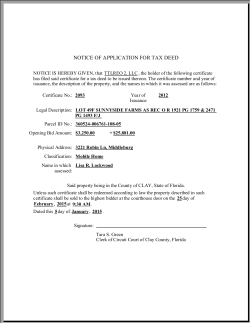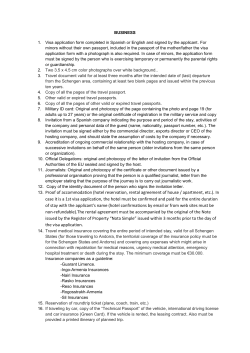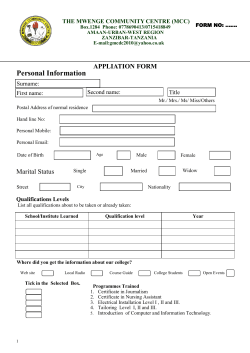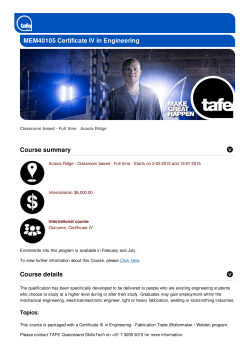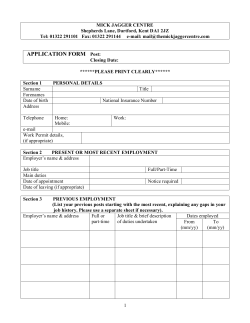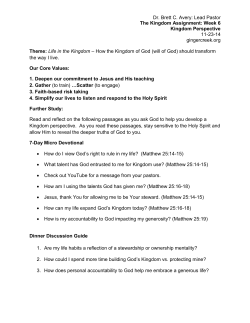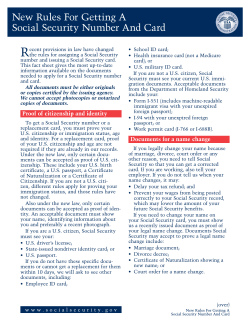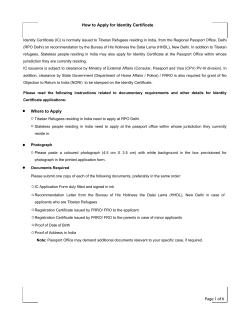
Guide ROA: Guide to the right of abode in the United
2011 Guide ROA Guide to the right of abode in the United Kingdom and applying for a certificate of entitlement Gov.UK What this guide contains: 1. Introduction. 2. The right of abode. 3. Who has the right of abode? 4. Certificates of entitlement. 5. How to apply for a certificate of entitlement. 6. Fees. 7. What to send with the application and how to contact us. 8. Expiry of certificate of entitlement. 9. Notes. 1 Introduction 1.1 This guide explains the meaning of right of abode in the United Kingdom under the Immigration Act 1971 (Part 2) and describes, in general terms, which people have that right (Part 3). It also explains, for those people who may have to prove their claim, how to obtain a certificate of entitlement to the right of abode in the United Kingdom using the application form (Parts 5-7). The notes in Part 9 of this guide explain some of the terms used. On 21s t December 2006 , new regulations relating to certificates of entitleme nt to the right of abode were introduced. After that date you will not qualify for a certificate of entitlement to be placed in your foreign passport or travel document if you hold a United Kingdom passport describing you as a British citizen or as a British subject with right of abode. From 12 December 2011 you will not qualify for a certificate of entitlement to the right of abode if you have a valid certificate of entitlement in a different passport. For example, if you have an Australian and Canadian passport, you cannot have a certificate of entitlement in both of them. The law covering the right of abode in the United Kingdom is contained in the Immigration Act 1971, the British Nationality Act 1981, the Nationality, Immigration and Asylum Act 2002, and the regulations made under them. The information i n this leaflet is meant only as a brief guide to the law and to the Home Secretary’s policy. It is not a comprehensive statement of either the law or the policy. You should complete this form only if you are applying within the UK. If you are applying overseas please visit the GOV.UK website. 2 The right of abode 2.1 If you have the right of abode in the United Kingdom, this means that you are entirely free from United Kingdom immigration control. You do not need to obtain the permission of an immigration officer to enter the United Kingdom, and you may live and work here without restriction. 2.2 However, you must prove your claim by production of either: a) a United Kingdom passport describing you as a British citizen or a British subject with the right of abode; or b) a certificate of entitlement to the right of abode in the United Kingdom issued by or on behalf of the Government of the United Kingdom. 2.3 Information about obtaining a United Kingdom passport is available from the Ide ntity and Passport Service: www.passport.gov.uk 3 Who has the right of abode? 3.1 Under section 2 of the Immigration Act 1971 (which was amended by section 39 of the British Nationality Act 1981), all British citizens and certain Commonwealth citizens have the right of abode in the United Kingdom. People who became British citizens on 1 January 1983 3.2 You will have become a British citizen on 1 January 1983 (when the British Nationality Act 1981 came into force) and will therefore have the right of abode in the United Kingdom if, immediately before that date: a. you were a citizen of the United Kingdom and Colonies and had your citizenship by being born, adopted, naturalised or registered in the United Kingdom; or b. (i) you were a citizen of the United Kingdom and Colonies and your parent at the time of your birth, was a citizen of the United Kingdom and Colonies by being born, adopted, naturalised or registered in the United Kingdom; or (ii) you were a citizen of the United Kingdom and Colonies whose parent qualified for the right of abode because their parent (your grandparent) was born, adopted, naturalised or registered in the United Kingdom. c. you were a citizen of the United Kingdom and Colonies who, at any time before 31 December 1982, • had been ordinarily resident in the United Kingdom for a continuous period of 5 years or more and, • during that period, you were not in breach of the immigration laws and, • at the end of that period, you did not have any time limit attached to your stay; or d. you were a citizen of the United Kingdom and Colonies who was or had been the wife of a man with the right of abode in the United Kingdom. (You must have been married before 1 January 1983). Please note that if you were a citizen of the United Kingdom and Colonies by birth in a former colony, you may have lost that status when that country became independent. In such cases you would only have a right of abode if you qualified under one of the provisions for Commonwealth citizens (see page 6). People who became British citizens after 1 January 1983 3.3 A person born in the United Kingdom after 1 January 1983 is a British citizen if his father or mother was, at that time: a. b. a British citizen; or settled in the United Kingdom. A person born in the United Kingdom or a qualifying territory on or after 21 May 2002 will also be a British citizen if, at the time of the birth, either parent is a British citizen, or settled in the United Kingdom or settled in that particular territory. 3.4 A person born outside the United Kingdom after 1 January 1983 is a British citizen if, at the time of the birth, his father or mother was: a. a British citizen otherwise than by descent; or b. a British citizen by descent and was in: i. Crown service, or ii. Comm unity institution service, or iii. Service specially designated by the Secretary of State as being closely associated with the activities of the United Kingdom government. Similar provisions apply for those born outside a qualifying territory after 21 May 2002. 3.5 A person who has successfully applied for registration or naturalisation as a British citizen will have become such a citizen on the date of registration or on the date of issue of the certificate of naturalisation. 3.6 A person adopted in the United Kingdom after 1 January 1983 or in a qualifying territory after 21 May 2002 is a British citizen if, on the date of the adoption, at least one of the adopters was a British citizen. A child adopted outside the United Kingdom under the terms of the Hague Conve ntion on or after 1 June 2003 by Intercountry Adoption will become a British citizen on the date of adoption if one of the adopters is a British citizen and the adopter (or, in the case of a joint adoption, both adopters) is habitually resident in the United Kingdom. *See note *See note *See note *See note *See note *See note 1 2 3 4 5 6 for for for for for for an explanation of an explanation of an explanation of an explanation of an explanation of an explanation of the the the the the the term United Kingdom terms parent and father term adopted term registered term settled term qualifying territory 3.7 Further information about British citizenship, including how this citizenshi p may be acquired after 1 January 1983, can be obtained on our website at https://www.gov.uk/browse/citizenship/citizenship or by contacting the Liverpool Contact Centre: Email: ukbanationalityenquiries@ukba.gsi.gov.uk Commonwealth citizenship 3.8 If you are not a British citizen, you could still have the right of abode if, on 31 December 1982: a) you were a Commonwealth citizen with a parent who, at the time of your birth or legal adoption was a citizen of the United Kingdom and Colonies and had his/her citizenship by being born in the United Kingdom. (NB If you were born before 1 January 1983 and your mother was born in the United Kingdom, you may qualify for registration as a British citizen. For further information see Guide UKM.) b) you were a Commonwealth citizen and before 1 January 1983 had been married to a man with the right of abode. (You must have been married before 1st January 1983 and your husband must have had the right of abode before that date.) Please note however, that if you acquired the right of abode through marriage before 1983 to a man with the right of abode you will not be granted a certificate of entitlement, if either: • another living wife or widow of the same man is, or has at any time since her marriage been, in the UK otherwise than as a visitor, an illegal entrant or on temporary admission, or • another living wife or widow of the same man has been granted a certificate of entitlement or entry clearance on account of her marriage. Note: If you were not a Commonwealth citizen on 31 December 1982 or you ceased to be a Commonwealth citizen (even temporarily) at any time after that date, you will not have the right of abode. For example, nationals of South Africa and Pakistan do not qualify because these countries left the Commonwealth before 1983 and rejoined afterwards. 4 Certificates of entitlement 4.1 A certificate of entitlement to the right of abode in the United Kingdom is placed in a valid passport. It constitutes proof of your right of abode for United Kingdom immigration control purposes (but see paragraph 2.2 regarding alternative forms of proof). If you hold a United Kingdom passport describing you as a British citizen, or as a British subject with the right of abode in the United Kingdom, you will not qualify for a certificate of entitlement. If you already have a valid certificate of entitlement in another foreign passport, you will not qualify for a certificate of entitlement. We will check with Her Majesty’s Passport Office (HMPO) to see if their records show that you hold a passport. If HMPO records show that you hold a current UK passport, describing you as a British citizen or as a British subject with the right of abode in the United Kingdom, we will not issue a certificate of entitlement. This is because Regulations do not allow a person to hold both a passport and a certificate of entitlement to the right of abode. If you have lost your British passport you should therefore notify the IPS so that their records can be updated. Until you notify IPS of the loss of your passport an application for a certificate of entitlement to the right of abode may be refused, as records will show that you are the holder of a British citizen or British subject passport. 4.2 The Home Office issues certificates of entitlement to eligible applicants in the United Kingdom. If you are abroad, you must apply through UK Visas (see page 2). 4.3 In both cases, a fee is payable for processing applications (see Part 6). 5 How to apply for a certificate of entitlement to the right of abode in the United Kingdom 5.1 Applications made in the United Kingdom for a certificate of entitlement to the right of abode are dealt with by the Right of Abode Team of UK Visas and Im migration, which is based in Liverpool. 5.2 If you want to make an application in the UK, you should send the completed application form, original documents (see section 7) and application fee, together with 2 passport size photographs, to: Department 1 UKVI The Capital New Hall Place Liverpool L3 9PP 5.3 Your claim will be examined and a certificate of entitlement to the right of abode in the United Kingdom will be issued if you qualify for one, provided you have produced satisfactory original documentary evidence and have paid the application fee. It is an offence under section 26 of the Immigration Act 1971 to make a return, statement or representation in relation to an application for a certificate of entitlement which the person making it knows or believes to be false. 5.4 For information about waiting times for right of abode applications please check our website https://www.gov.uk/browse/citizenship/citizenship https://www.gov.uk/browse/citizenship/citizenship. 5.5 We will treat information you give us in confidence but may share it with other government departments, agencies and local authorities so they can carry out their own work. 5.6 Where we refuse to issue a certificate of entitlement to the right of abode you will have a right of appeal. We will tell you about this when we inform you of our decision. 5.7 If someone is acting on your behalf, such as a solicitor, you should provide their details on the form. OISC and Immigration Advice Immigration or nationality advisers acting in the course of business (whether paid or unpaid) are regulated by the Office of the Immigration Services Commissioner (OISC), an independent body. The provision of such advice is prohibited unless a person works for an organisation registered with, or exempted by, the OISC or is authorised to practise (like solicitors and barristers) by a designated professional body. Certain categories (e.g. public health bodies) are exempted from the regulatory scheme by Ministerial Order. It is a criminal offence to provide advice or services in contravention of the regulatory scheme. Further information about the regulatory scheme can be obtained from: Office of the Im migration Services Commissioner: 5th Floor Counting House Tooley Street LONDON SE1 2QN Tel: 020 7211 1500 Fax: 020 7211 1553 A full list of OISC regulated advisers is available on its website at www.oisc.gov.uk 6 Fees 6.1 A fee is required with each application for a certificate of entitlement to the right of abode in the United Kingdom. The current fee is listed in the fees leaflet. https://www.gov.uk/government/publications/fees-for-citizenship-applications 6.2 You may pay by cheque, credit or debit card. Please do not send cash, transcash or postal orders. If you are paying the fee by cheque please ensure that the cheque is crossed “a/c payee” and made payable to the Accounting Officer, Home Office. If you pay by cheque, you should ensure that you have sufficient funds available. If you do not pay the correct fee, the application will not be accepted. If you are applying from abroad, information about fees can be obtained on the Visa Fees page of our website: https://www.gov.uk/visa-fees. If your application is refused because you do not qualify for a certificate of entitlement to the right of abode, or you do not send sufficient documentation to establish your claim, the fee paid will not be refunded. 7 What to send with the application • You must send your valid passport or travel document. Passports issued abroad which are being submitted for an application made in the UK must contain immigration stamps showing that the passport holder is resident in the UK. • You must enclose 2 passport size photographs taken no more than 6 months before the date of application. • You should also send the documents needed to establish that you have a right of abode. The list below tells you what documents you need to send. Original documents should be sent - photocopies are not acceptable. Birth and marriage certificates should be those issued at the time of birth or marriage. If not, please explain w hy. • If you are currently using a different name than the name on your official documents you should provide documentary evidence of the change of name, such as your marriage certificate, adoption certificate or change of name deed. Basis of application Documents required Applicant was registered or naturalised as a Applicant’s registration or naturalisation British citizen on or after 1st January 1983 certificate Applicant was born in the United Kingdom before 1st January 1983 Applicant’s full birth certificate, showing parents’ details Applicant was registered or naturalised as a citizen of the United Kingdom and Colonies in the United Kingdom before 1st January 1983 Applicant’s registration or naturalisation certificate Applicant was a British overseas territories citizen and became a British citizen on 21 May 2002 (i) Applicant’s British overseas territories citizen passport; (ii) Applicant’s full birth certificate showing parents’ details; (iii) If born outside an overseas territory, parent’s marriage certificate (if claiming through the father) and parent’s full birth certificate, registration or naturalisation certificate (iv) If registered or naturalised as a British overseas territories citizen before 21 May 2002, certificate of registration or naturalisation (v) If registered or naturalised as a British overseas territories citizen on or after 21 May 2002, certificate of registration or naturalisation and certificate of registration as a British citizen Applicant is a Commonwealth (not British) citizen born before 1st January 1983 to a parent who was born in the United Kingdom (i) Applicant’s full birth certificate showing parents’ details; and (ii) Parent’s full UK birth certificate (iii) If claiming through the father, the marriage certificate Applicant is a female Commonwealth citizen who was married before 1st (ii) January 1983 to a man with right of abode in the United Kingdom (NB - the marriage must have taken place before 1 January 1983, and the husband should have had a right of abode before that date) (i) Applicant’s marriage certificate; and Evidence of applicant's husband's right of abode prior to 1 January 1983, e.g. passport or UK birth certificate, certificate of registration or naturalisation Applicant was born in the United (i) Applicant’s full birth certificate showing Kingdom or the Falkland Islands on or parents’ details; after 1st January 1983, or in another (ii) Evidence of either parent’s British citizenship qualifying British overseas territory on or or settled status at time of applicant’s birth, after 21st May 2002 e.g. a passport describing the relevant parent as a British citizen or indicating that he or she then had indefinite leave to remain; and (iii) Parents’ marriage certificate (if claiming through father) Applicant was born outside the United (i) Kingdom and the Falkland Islands on or after 1st January 1983, or outside the (ii) United Kingdom and any qualifying British overseas territory on or after 21st May (iii) 2002, to a parent born in the United Kingdom or the Falkland Islands (or, on/after 21st May 2002, any qualifying British overseas territory) or to a parent registered or naturalised in the United Kingdom prior to the applicant’s birth Applicant’s full birth certificate showing parents’ details; Parents’ marriage certificate (if claiming through father); and Parents’ full birth certificate, registration or naturalisation certificate Applicant was born outside the United Kingdom and the Falkland Islands on or (ii) after 1st January 1983, or outside the United Kingdom and(iii) any qualifying British overseas territory on or after 21st May 2002, to a parent who, at the time of the birth, was a British citizen in service to which section 2(l)(b) of the British Nationality Act 1981 applies Applicant was adopted in the United Kingdom, a qualifying British overseas (ii) territory, or otherwise on or after 1 June 2003 under the terms of the Hague Conve ntion on Intercountr y Adoption (i) Applicant’s full birth certificate; Parents’ marriage certificate (if claiming through father); and Evidence of parent’s relevant employment at the time of the birth, e.g. a letter from the employer Applicant was a citizen of the United (i) Kingdom and Colonies and was ordinarily resident in the United Kingdom for a continuous period of 5 years before 1st January 1983 and was settled in the (ii) United Kingdom at the end of that period Evidence of citizenship of the United Kingdom and Colonies, e.g. a passport or certificate of naturalisation or registration; and Evidence of settlement and 5 years’ ordinary residence in the UK before 1983, e.g. passport, P60s, details of National Insurance contributions, DSS claims, employers’ letters (i) Applicant’s adoption certificate; and Evidence of adoptive parents’ citizenship and, if a Convention adoption, of their place of habitual residence at the time of the adoption, e.g. in respect of citizenship, a passport, and in respect of habitual residence at the time of the Convention adoption, the adoption certificate Applicant was a citizen of the United (i) Kingdom and Colonies and had a parent who was born, adopted, registered or (ii) naturalised in the United Kingdom prior to the applicant’s birth/adoption (iii) Applicant was a citizen of the United (i) Kingdom and Colonies and had a grandparent born, adopted, registered or (ii) naturalised in the United Kingdom before the applicant’s parent’s birth/adoption (iii) (iv) (v) Applicant’s full birth certificate or adoption certificate; Parents’ marriage certificate (if claiming through father); and Parent’s full birth certificate, adoption, registration or naturalisation certificate Parents’ marriage certificate (if claiming through father); Parents’ full birth certificate or adoption certificate; Applicant’s full birth certificate or adoption certificate; Grandparents’ marriage certificate (if claiming through grandfather); and Grandparent’s full birth certificate, adoption, registration or naturalisation certificate Contacting us If you are not sure whether or not you have the right of abode in the United Kingdom, you can obtain further advice by visiting the GOV.UK website. Alternatively you can contact us using the email address below: ukbanationalityenquiries@ukba.gsi.gov.uk 8 Expiry of certificate of entitlement to the right of abode in the United Kingdom A certificate of entitlement to the right of abode will cease to be valid on the date the passport or travel docume nt to which it is attached expires. If you wish to have a certificate of entitlement placed in your new passport you will need to make a fresh application. Certificates issued after 21 December 2006 may be revoked by any Home Office official (including Identity and Passport Service officials), an immigration officer, consular officer or entry clearance officer if it is discovered that the holder is no longer eligible to have it. A certificate of entitlement may be revoked if it is established that: • you do not have a right of abode in the United Kingdom, or • you hold a UK passport describing you as a British citizen or a British subject with the right of abode, or • you have another passport with a valid certificate of entitlement; or • your right of abode is restricted because you are polygamously married to a man with the right of abode and another wife has already been issued with a certificate of entitlement (see section 3), or • an order has been made to deprive you of your right of abode. 9 Notes 1. United Kingdom means: • England, Wales, Scotland, Northern Ireland, the Channel Islands and the Isle of Man; and • the Republic of Ireland at a time when it formed part of the United Kingdom (that is to say, before 31 March 1922); and • (in relation to birth) a ship or aircraft registered in the United Kingdom or an unregistered ship or aircraft of the Government of the United Kingdom. 2 Parent includes: • for children born before 1 July 2006: the mother, but not the father, of an illegitimate child. (However, such a child may be legitimated by the subsequent marriage of his or her parents.) • for children born after 1 July 2006: the father of an illegitimate child who may be able to pass on his citizenship in the same way as if he had been married to the mother • the adoptive parents of a child who has been legally adopted (see note 3). 3. Legal adoption means an adoption as defined in the Adoption and Children Act 2002. A child of any nationality who was adopted in the United Kingdom on or after 1 January 1950, or in the Channel Islands or the Isle of Man on or after 1 April 1959, automatically became a citizen of the United Kingdom and Colonies on his adoption if the adoptive father (or adoptive mother, if she was the sole adopter) was a citizen of the United Kingdom and Colonies at the time of the adoption. 4. Registration in the United K ingdom Includes registration at the High Commission in an independent Commonwealth country. (This means that the country m ust have been independent at the time of the registration). It does not include: • registration under section 6(2) of the British Nationality Act 1948 (registration on the grounds of marriage to a citizen of the United Kingdom and Colonies) if the marriage took place after 28 October 1971; or • registration under section 7 of the British Nationality Act 1948 (registration of minors) at a High Commission after 28 October 1971; or • registration under section 12(6) of the British Nationality Act 1948 at a High Commission. As regards paragraph 3.2 (people who became British citizens on 1 January 1983), it should be noted that a person who was registered under section 1(1) (a) of the British Nationality (No. 2) Act 1964 did not become a British citizen unless his or her mother became a British citizen on that date and the person had the right of abode in the way described in 3.2(c). 5. Settled in the United K ingdom Means being ordinarily resident in the United Kingdom without being subject to any time limit under the immigration laws. A person is not settled if he or she is in the United Kingdom in breach of the immigration laws. A person may also be exempt from immigration control because he or she is a member of a diplomatic or consular mission, visiting forces or an international organisation. An EEA national would be regarded as settled if: a) Before 2 October 2000 - he or she was in the UK exercising a Treaty right b) Between 2 October 2000 and 30 April 2006 - he or she had indefinite leave to remain in the UK. (This does no t apply to EEA nationals with an unconditional right of residence, such as retired people or someone who is unable to work because of incapacity) c) After 30th April 2006 - he or she has been exercising a Treaty right for more than 5 years or has indefinite leave to remain. 6. British overseas territories means Anguilla, Bermuda, British Antarctic Territory, British Indian Ocean Territory, Cayman Islands, Falkland Islands, Gibraltar, Montserrat, Pitcairn, Henderson, Ducie & Oeno Islands. St. Helena & Dependencies, South Georgia and the South Sandwich Islands (except before 4th December 2001), Sovereign Base Areas of Akrotiri and Ohekelia, Turks & Caicos Islands and Virgin Islands. References to a “qualifying territory” are references to these territories, but not the Sovereign Base Areas of Akrotiri and Ohekelia. 7. Settled in a qualifying territory Means being ordinarily resident in a qualifying territory without being subject to any time limit under the immigration laws. A person is not settled if he or she is in that territory in breach of the immigration laws. A person may also be exempt from immigration control because he or she is a member of a diplomatic or consular mission, visiting forces or an international organisation. There may also be other categories of persons who are not regarded as settled in a British overseas territory. This will depend upon the local immigration laws.
© Copyright 2025
